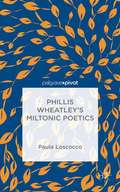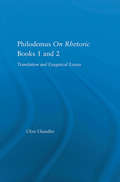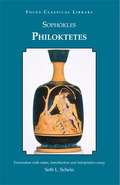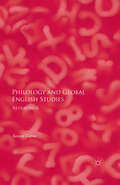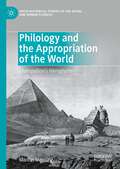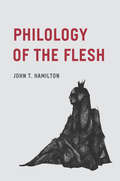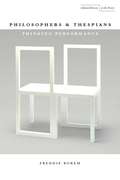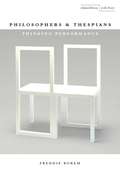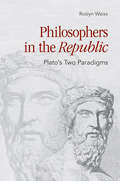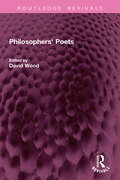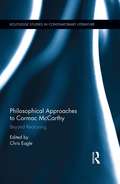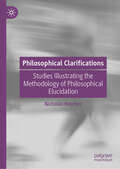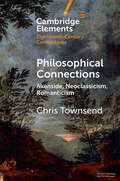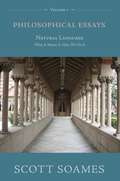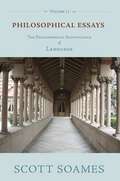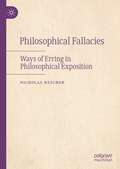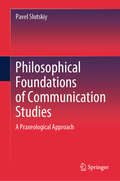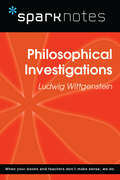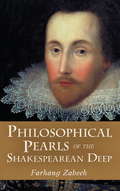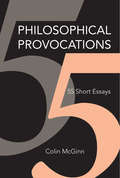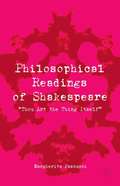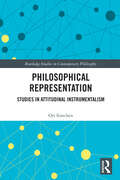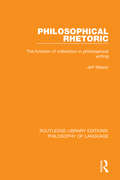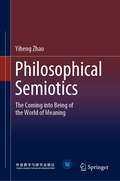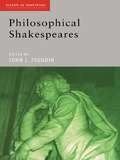- Table View
- List View
Phillis Wheatley’s Miltonic Poetics
by Paula LoscoccoPhillis Wheatley, the African-born slave poet, is considered by many to be a pioneer of Anglo-American poetics. This study argues how in her 1773 POEMS, Wheatley uses John Milton's poetry to develop an idealistic vision of an emerging Anglo-American republic comprised of Britons, Africans, Native Americans, and women.
Philodemus on Rhetoric Books 1 and 2: Translation and Exegetical Essays (Studies in Classics)
by Clive ChandlerThe Epicureans were notorious in antiquity for denigrating most forms of civic participation and for rejecting those cultural activities (such as poetry, music, and rhetoric) which are broadly labelled paideia. In this, as in all else, they ostensibly took their cue from Epicurus and the other founders of the School. In contrast to this, the Epicurean Philodemus, who lived and wrote in Italy in the first century B.C., presents an interesting case. For a substantial portion of his surviving work is preoccupied with investigations into this paideia and with demonstrating how an orthodox Epicurean is to approach them. This book selects one of those investigations, the first two books of Philodemus' On Rhetoric. An annotated translation is provided of the most recent edition of this text (Longo Auricchio 1977) which is followed by a series of essays which aim to clarify Philodemus' conception of, and approach to, the problem of rhetoric for Epicureans, and in particular the way he manages citations from the works of the founders to support his arguments against other Epicureans who take a different view. The book constitutes a very helpful guide to this fragmentary and difficult text.
Philoktetes
by Sophocles Seth L. ScheinThis is an English translation of Sophocles' tragedy of Philoctetes, an archer who had been abandoned on Lemnos by the rest of the Greek fleet while on the way to Troy. Focus Classical Library provides close translations with notes and essays to provide access to understanding Greek culture.
Philology and Global English Studies: Retracings
by Suman GuptaThis book retraces the formation of modern English Studies by departing from philological scholarship along two lines: in terms of institutional histories and in terms of the separation of literary criticism and linguistics.
Philology and the Appropriation of the World: Champollion’s Hieroglyphs (Socio-Historical Studies of the Social and Human Sciences)
by Markus MesslingThis book sheds new light on the work of Jean-François Champollion by uncovering a constellation of epistemological, political, and material conditions that made his decipherment of Egyptian hieroglyphs possible. Champollion’s success in understanding hieroglyphs, first published in his Lettre à M. Dacier in 1822, is emblematic for the triumphant achievements of comparative philology during the 19th Century. In its attempt to understand humanity as part of a grand history of progress, Champollion’s conception of ancient Egypt belongs to the universalistic aspirations of European modernity. Yet precisely because of its success, his project also reveals the costs it entailed: after examining and welcoming acquisitions for the emerging Egyptian collections in Europe, Champollion travelled to the Nile Valley in 1828/29, where he was shocked by the damage that had been done to its ancient cultural sites. The letter he wrote to the Egyptian viceroy Mehmet Ali Pasha in 1829 demands that excavations in Egypt be regulated, denounces European looting, and represents perhaps the first document to make a case for the international protection of cultural goods in the name of humanity.
Philology of the Flesh
by John T. HamiltonAs the Christian doctrine of Incarnation asserts, “the Word became Flesh.” Yet, while this metaphor is grounded in Christian tradition, its varied functions far exceed any purely theological import. It speaks to the nature of God just as much as to the nature of language. In Philology of the Flesh, John T. Hamilton explores writing and reading practices that engage this notion in a range of poetic enterprises and theoretical reflections. By pressing the notion of philology as “love” (philia) for the “word” (logos), Hamilton’s readings investigate the breadth, depth, and limits of verbal styles that are irreducible to mere information. While a philologist of the body might understand words as corporeal vessels of core meaning, the philologist of the flesh, by focusing on the carnal qualities of language, resists taking words as mere containers. By examining a series of intellectual episodes—from the fifteenth-century Humanism of Lorenzo Valla to the poetry of Emily Dickinson, from Immanuel Kant and Johann Georg Hamann to Friedrich Nietzsche, Franz Kafka, and Paul Celan—Philology of the Flesh considers the far-reaching ramifications of the incarnational metaphor, insisting on the inseparability of form and content, an insistence that allows us to rethink our relation to the concrete languages in which we think and live.
Philosophers and Thespians
by Freddie RokemRokem (art, Tel Aviv U. ) focuses on four specific encounters between philosophers and thespians in order to explore relationships between the discursive practices of theater and philosophy. They are Plato's Symposium and the ancient quarrel between philosophy and poetry, Hamlet as philosopher and thespian, the Nietzsche-Strindberg correspondence, and Walter Benjamin and Bertold Brecht discuss Franz Kafka. In addition, he discusses accidents and catastrophic constellations in performative agendas and the performative storytelling of Walter Benjamin. Annotation c2010 Book News, Inc. , Portland, OR (booknews. com)
Philosophers and Thespians: Thinking Performance
by Freddie RokemThe interaction between philosophy and theater or performance has recently become an important and innovative area of inquiry. Philosophers and Thespians contribute to this emerging field by looking at four direct encounters between philosophers and thespians, beginning with Socrates.
Philosophers in the Republic: Plato's Two Paradigms
by Roslyn WeissIn Plato's Republic, Socrates contends that philosophers make the best rulers because only they behold with their mind's eye the eternal and purely intelligible Forms of the Just, the Noble, and the Good. When, in addition, these men and women are endowed with a vast array of moral, intellectual, and personal virtues and are appropriately educated, surely no one could doubt the wisdom of entrusting to them the governance of cities. Although it is widely-and reasonably-assumed that all the Republic's philosophers are the same, Roslyn Weiss argues in this boldly original book that the Republic actually contains two distinct and irreconcilable portrayals of the philosopher.According to Weiss, Plato's two paradigms of the philosopher are the "philosopher by nature" and the "philosopher by design." Philosophers by design, as the allegory of the Cave vividly shows, must be forcibly dragged from the material world of pleasure to the sublime realm of the intellect, and from there back down again to the "Cave" to rule the beautiful city envisioned by Socrates and his interlocutors. Yet philosophers by nature, described earlier in the Republic, are distinguished by their natural yearning to encounter the transcendent realm of pure Forms, as well as by a willingness to serve others-at least under appropriate circumstances. In contrast to both sets of philosophers stands Socrates, who represents a third paradigm, one, however, that is no more than hinted at in the Republic. As a man who not only loves "what is" but is also utterly devoted to the justice of others-even at great personal cost-Socrates surpasses both the philosophers by design and the philosophers by nature. By shedding light on an aspect of the Republic that has escaped notice, Weiss's new interpretation will challenge Plato scholars to revisit their assumptions about Plato's moral and political philosophy.
Philosophers' Poets (Routledge Revivals)
by David WoodFirst published in 1990, Philosophers’ Poets is a collection of case studies of philosophers’ readings of poets and other distinctive writers. There are those, for example, who find in literary examples ways of exploring the concrete significance of philosophical assertions or distinctions. Others find in poetic discourse linguistic resources simply not available to philosophy, yet of vital importance to it. This is particularly true of philosophers of the limit, such as Heidegger, Derrida, Levinas and Adorno, for whom the very possibility of philosophy was in question. Despite the diversity of subjects covered, the collection maintains an integrity and identity. Above all, it shows how contemporary Continental philosophy raises the issue of philosophy and literature anew in a way that is appealing and challenging.
Philosophical Approaches to Cormac McCarthy: Beyond Reckoning (Routledge Studies in Contemporary Literature)
by Christopher EagleThis book is the first edited collection to explore the role of philosophy in the works of Cormac McCarthy, significantly expanding the scope of philosophical inquiry into McCarthy’s writings. There is a strong and growing interest amongst philosophers in the relevance of McCarthy’s writings to key debates in contemporary philosophy, for example, debates on trauma and violence, on the relationship between language and world, and the place of the subject within history, temporality, and borders. To this end, the contributors to this collection focus on how McCarthy’s writings speak to various philosophical themes, including violence, war, nature, history, materiality, and the environment. Emphasizing the form of McCarthy’s texts, the chapters attend to the myriad ways in which his language effects a philosophy of its own, beyond the thematic content of his narratives. Bringing together scholars in contemporary philosophy and McCarthy Studies, and informed by the release of the Cormac McCarthy Papers, the volume reflects on the theoretical relationship between philosophical thinking and literary form. This book will appeal to all scholars working in the rapidly-growing field of McCarthy Studies, Philosophy and Literature, and to philosophers working on a wide range of problems in ethics, aesthetics, epistemology, Philosophy of Nature, and Philosophy of Film across ancient, modern, and contemporary philosophy.
Philosophical Clarifications: Studies Illustrating the Methodology of Philosophical Elucidation
by Nicholas RescherThis book is an integrated series of philosophical investigations that offers significant new insights into key philosophical concerns ranging from methodological issues to substantive doctrines. Consisting of three sections, it first deals with the nature of philosophizing itself and seeks to illustrate the project from the angle of the pragmatic tradition. The second section is devoted to issues of knowledge and how the cognitive project goes about producing results that are cogent and objective. The third and closing section considers how the ideas and perspectives of these considerations can be applied and implemented in various matters of personal judgment and practice.
Philosophical Connections: Akenside, Neoclassicism, Romanticism (Elements in Eighteenth-Century Connections)
by Chris TownsendNeoclassical and Romantic verse cultures are often assumed to sit in an oppositional relationship to one another, with the latter amounting to a hostile reaction against the former. But there are in fact a good deal of continuities between the two movements, ones that strike at the heart of the evolution of verse forms in the period. This Element proposes that the mid-eighteenth-century poet Mark Akenside, and his hugely influential Pleasures of Imagination, represent a case study in the deep connections between Neoclassicism and Romanticism. Akenside's poem offers a vital illustration of how verse was a rival to philosophy in the period, offering a new perspective on philosophic problems of appearance, or how the world 'seems to be'. What results from this is a poetic form of knowing: one that foregrounds feeling over fact, that connects Neoclassicism and Romanticism, and that Akenside called the imagination's 'pleasures'.
Philosophical Essays, Volume 1: Natural Language: What It Means and How We Use It
by Scott SoamesThe two volumes of Philosophical Essays bring together the most important essays written by one of the world's foremost philosophers of language. Scott Soames has selected thirty-one essays spanning nearly three decades of thinking about linguistic meaning and the philosophical significance of language. A judicious collection of old and new, these volumes include sixteen essays published in the 1980s and 1990s, nine published since 2000, and six new essays. The essays in Volume 1 investigate what linguistic meaning is; how the meaning of a sentence is related to the use we make of it; what we should expect from empirical theories of the meaning of the languages we speak; and how a sound theoretical grasp of the intricate relationship between meaning and use can improve the interpretation of legal texts. The essays in Volume 2 illustrate the significance of linguistic concerns for a broad range of philosophical topics--including the relationship between language and thought; the objects of belief, assertion, and other propositional attitudes; the distinction between metaphysical and epistemic possibility; the nature of necessity, actuality, and possible worlds; the necessary a posteriori and the contingent a priori; truth, vagueness, and partial definition; and skepticism about meaning and mind. The two volumes of Philosophical Essays are essential for anyone working on the philosophy of language.
Philosophical Essays, Volume 2: The Philosophical Significance of Language
by Scott SoamesThe two volumes of Philosophical Essays bring together the most important essays written by one of the world's foremost philosophers of language. Scott Soames has selected thirty-one essays spanning nearly three decades of thinking about linguistic meaning and the philosophical significance of language. A judicious collection of old and new, these volumes include sixteen essays published in the 1980s and 1990s, nine published since 2000, and six new essays. The essays in Volume 1 investigate what linguistic meaning is; how the meaning of a sentence is related to the use we make of it; what we should expect from empirical theories of the meaning of the languages we speak; and how a sound theoretical grasp of the intricate relationship between meaning and use can improve the interpretation of legal texts. The essays in Volume 2 illustrate the significance of linguistic concerns for a broad range of philosophical topics--including the relationship between language and thought; the objects of belief, assertion, and other propositional attitudes; the distinction between metaphysical and epistemic possibility; the nature of necessity, actuality, and possible worlds; the necessary a posteriori and the contingent a priori; truth, vagueness, and partial definition; and skepticism about meaning and mind. The two volumes of Philosophical Essays are essential for anyone working on the philosophy of language.
Philosophical Fallacies: Ways of Erring in Philosophical Exposition
by Nicholas RescherThis book examines the nature, sources, and implications of fallacies in philosophical reasoning. In doing so, it illustrates and evaluates various historical instances of this phenomenon. There is widespread interest in the practice and products of philosophizing, yet the important issue of fallacious reasoning in these matters has been effectively untouched. Nicholas Rescher fills this gap by presenting a systematic account of the principal ways in which philosophizing can go astray.
Philosophical Foundations of Communication Studies: A Praxeological Approach
by Pavel SlutskiyThis book explores the philosophical foundations of communication studies, suggesting that communication phenomena extend beyond the scope of traditional scientific methods. It argues that communication, deeply intertwined with human behavior, cannot be fully comprehended through empirical methods alone. The book presents an epistemological alternative to empiricism in communication studies—an alternative rooted in the praxeological perspective. Drawing from the principles of rationalism, it proposes that conclusions about communication can be deduced from a priori theoretical truths, rather than empirical evidence. This book is a crucial resource for scholars in both philosophy and communication studies.
Philosophical Investigations (SparkNotes Philosophy Guide)
by SparkNotesPhilosophical Investigations (SparkNotes Philosophy Guide) Making the reading experience fun! SparkNotes Philosophy Guides are one-stop guides to the great works of philosophy–masterpieces that stand at the foundations of Western thought. Inside each Philosophy Guide you&’ll find insightful overviews of great philosophical works of the Western world.
Philosophical Pearls of the Shakespearean Deep
by Farhang ZabeehOffers many fresh insights that will give even longtime readers of Shakespeare a new appreciation of the great master.Scholars have long debated the extent of Shakespeare's education. Although his friend and admirer Ben Jonson said of him, "thou hadst small Latine and lesse Greek," Shakespeare's plays reveal a wide familiarity with literary and philosophical works from the Renaissance, the Middle Ages, and the classical age. Philosopher Farhang Zabeeh delves into this fascinating topic in this detailed study of the philosophical influences evident in Shakespeare's plays and sonnets. Readers will be surprised and delighted to discover in Shakespeare unmistakable echoes of Plato, Aristotle, Cicero, Dante, Montaigne, and other famous thinkers. In one chapter, the author makes a convincing case that one of the bard's most famous comic characters, John Falstaff, is a parody of Socrates. In other chapters, he demonstrates indirect references to Plato in Shakespearean passages concerning appearance versus reality, as well as the influence of Aristotle's ethics. Other common philosophical themes evident in the plays concern the nature of time, subjectivity versus objectivity, and political and moral values. This new work offers many fresh insights that will give even longtime readers of Shakespeare a new appreciation of the great master.
Philosophical Provocations: 55 Short Essays
by Colin McGinnPithy, direct, and bold: essays that propose new ways to think about old problems, spanning a range of philosophical topics. In Philosophical Provocations, Colin McGinn offers a series of short, sharp essays that take on philosophical problems ranging from the concept of mind to paradox, altruism, and the relation between God and the Devil. Avoiding the usual scholarly apparatus and embracing a blunt pithiness, McGinn aims to achieve as much as possible in as short a space as possible while covering as many topics as possible. Much academic philosophical writing today is long, leaden, citation heavy, dense with qualifications, and painful to read. The essays in Philosophical Provocations are short, direct, and engaging, often challenging philosophical orthodoxy as they consider issues in mind, language, knowledge, metaphysics, biology, ethics, and religion. McGinn is looking for new ways to think about old problems. Thus he writes, about consciousness, “I think we have been all wrong,” and goes on to suggest that both consciousness and the unconscious are mysteries. Summing up his proposal on altruism, he remarks, “My suggestion can now be stated, somewhat brutally, as follows: human altruism is the result of parasitic manipulation.” He takes a moment to reflect: “I really don't know why it is good to be alive, though I am convinced that the standard suggestions don't work.” McGinn gets straight to the point and states his position with maximum clarity. These essays offer provocative invitations to think again.
Philosophical Readings of Shakespeare
by Margherita PascucciThis book offers a close philosophical reading of King Lear and Timon of Athens which provides insights into the groundbreaking ontological discourse on poverty and money. Analysis of the discourse of poverty and the critique of money helps to read Shakespeare philosophically and opens new reflections on central questions of our own time.
Philosophical Representation: Studies in Attitudinal Instrumentalism (Routledge Studies in Contemporary Philosophy)
by Ori SimchenThis book focuses on how we should treat philosophy’s theoretical representations. It argues in favor of an instrumentalist attitude towards pivotal cases of theoretical representation in philosophy that are commonly regarded under a realist attitude. Philosophy is awash with theoretical representations, which raises the question of how we should regard them. This book argues that representations in philosophy should not be regarded under a realist attitude by default as individually disclosing the nature of what they represent. Ori Simchen introduces the reader to the general theme of representations in philosophy and our attitudes towards them via case studies: numbers, modality, and belief. He offers a framework for deciding when a realist attitude towards a theoretical representation is warranted and concludes that the representations deployed in the case studies fail the proposed test. The next part of the book illustrates the attractiveness of attitudinal instrumentalism towards representations in semantics, in the philosophy of mind, and within the problematics of rule-following. Philosophical Representation will appeal to researchers and advanced students working in philosophy of language, philosophy of mind, metaphysics, philosophical logic, and philosophical methodology.
Philosophical Rhetoric: The Function of Indirection in Philosophical Writing
by Jeff MasonThis book, originally published in 1989 discusses an issue central to all philosophical argument – the relation between persuasion and truth. The techniques of persuasion are indirect and not always fully transparent. Whether philosophers and theoreticians are for or against the use of rhetoric, they engage in rhetorical practice none the less. Focusing on Plato, Descartes, Kant, Kierkegaard, Nietzsche and Wittgenstein, this book uncovers philosophical rhetoric at work and reminds us of the rhetorical arena in which philosophical writings are produced and considered.
Philosophical Semiotics: The Coming into Being of the World of Meaning
by Yiheng ZhaoThis book attempts to solve the question whether semiotics is a methodology as is generally held and if the studies of meaning and the mind can shed light on a series of metaphysical issues, so that the edifice of semiotics could be erected on a philosophical ground. It proposes that a philosophical semiotics is, by necessity, a semiotic phenomenology about the construction of the “world of meaning” by signs, and any discussion about semiotics has to proceed around two core issues: meaning and the mind.This book particularly exemplifies the semiotic connections in various schools of traditional Chinese philosophies. In the “Pre-Imperial Age” (before BC 300), there emerged an abundance of semiotic thinking in China, from Yijing the first sign system that aims to explain everything in the world, to the Namists’s subtle argument about the form of meaning, from the Yin-Yang/five elements of the Han, to the “Things are non-existent while mind is non-non-existent” principle of the Vijñāptimātratāsiddhi School of Buddhism in the Tang, and from the Sudden Revelation of Chan Buddhism to the “Nothing outside the mind” endorsed by the Mindist Confucianism in the Ming. The mighty trend of philosophical heritage provides rich food to our understanding of the form of meaning.
Philosophical Shakespeares (Accents on Shakespeare)
by John J. JoughinShakespeare continues to articulate the central problems of our intellectual inheritance. The plays of a Renaissance playwright still seem to be fundamental to our understanding and experience of modernity.Key philosophical questions concerning value, meaning and justice continue to resonate in Shakespeare's work. In the course of rethinking these issues, Philosophical Shakespeares actively encourages the growing dissolution of boundaries between literature and philosophy. The approach throughout is interdisciplinary, and ranges from problem-centred readings of particular plays to more general elaborations of the significance of Shakespeare in relation to individual thinkers or philosophical traditions.
